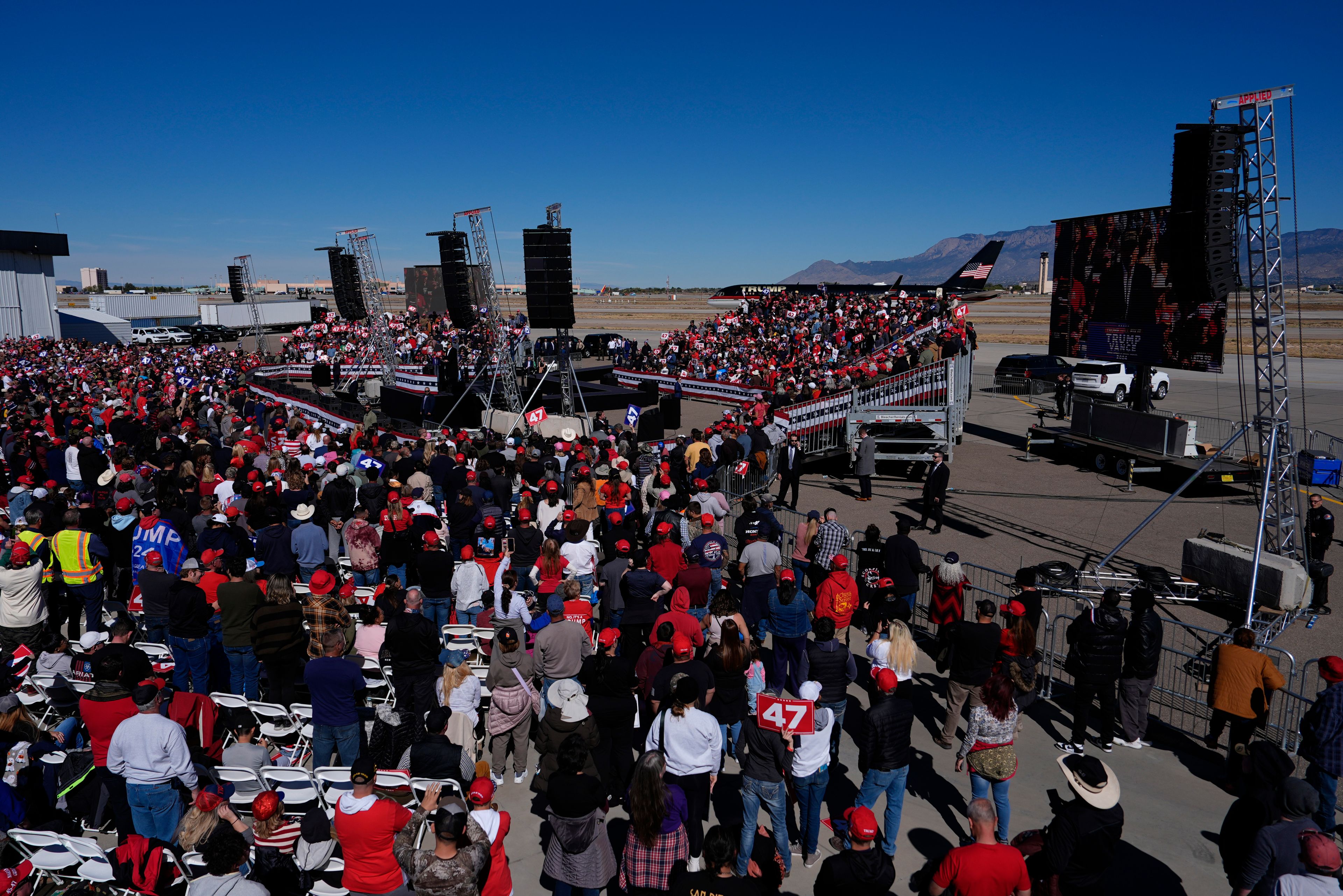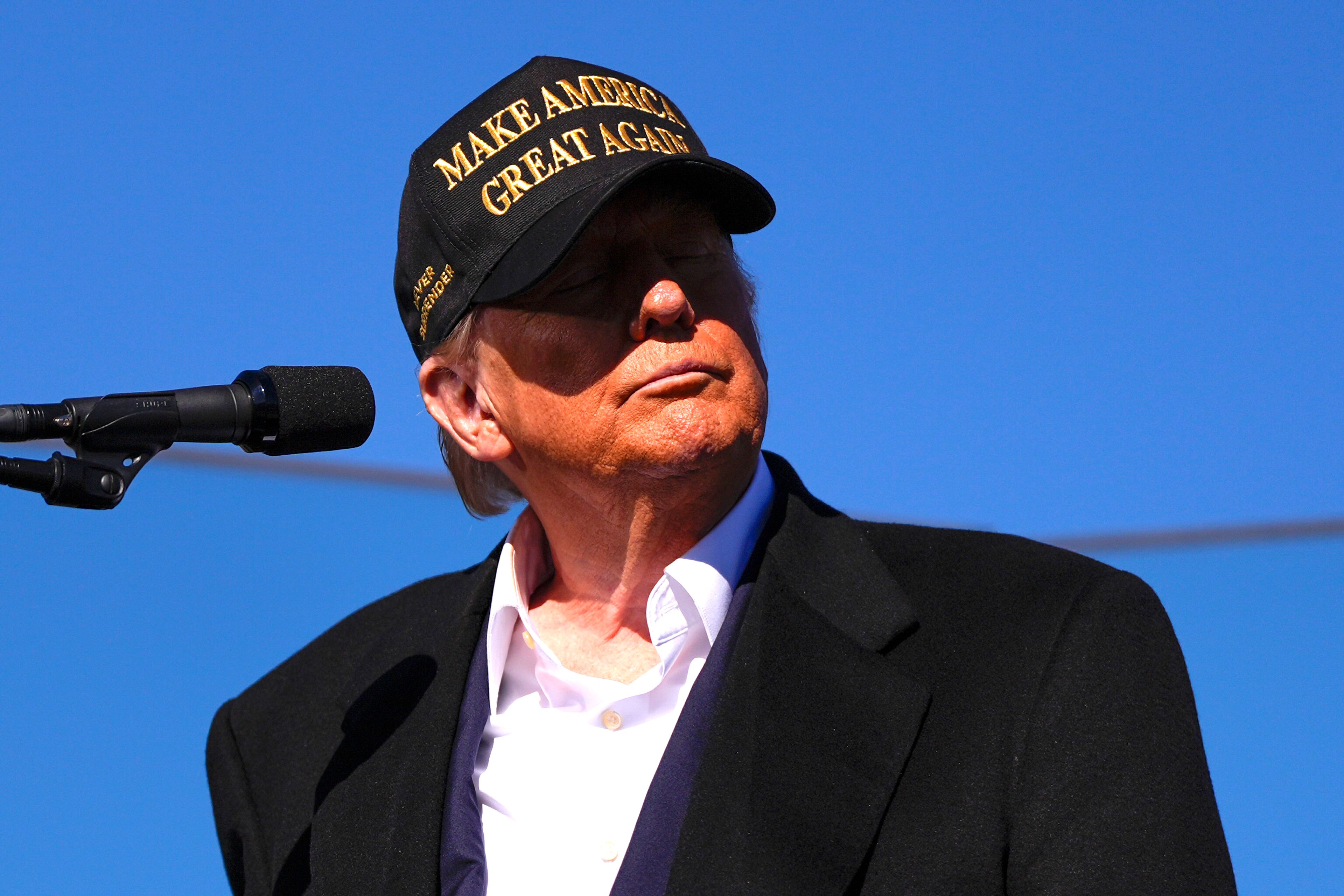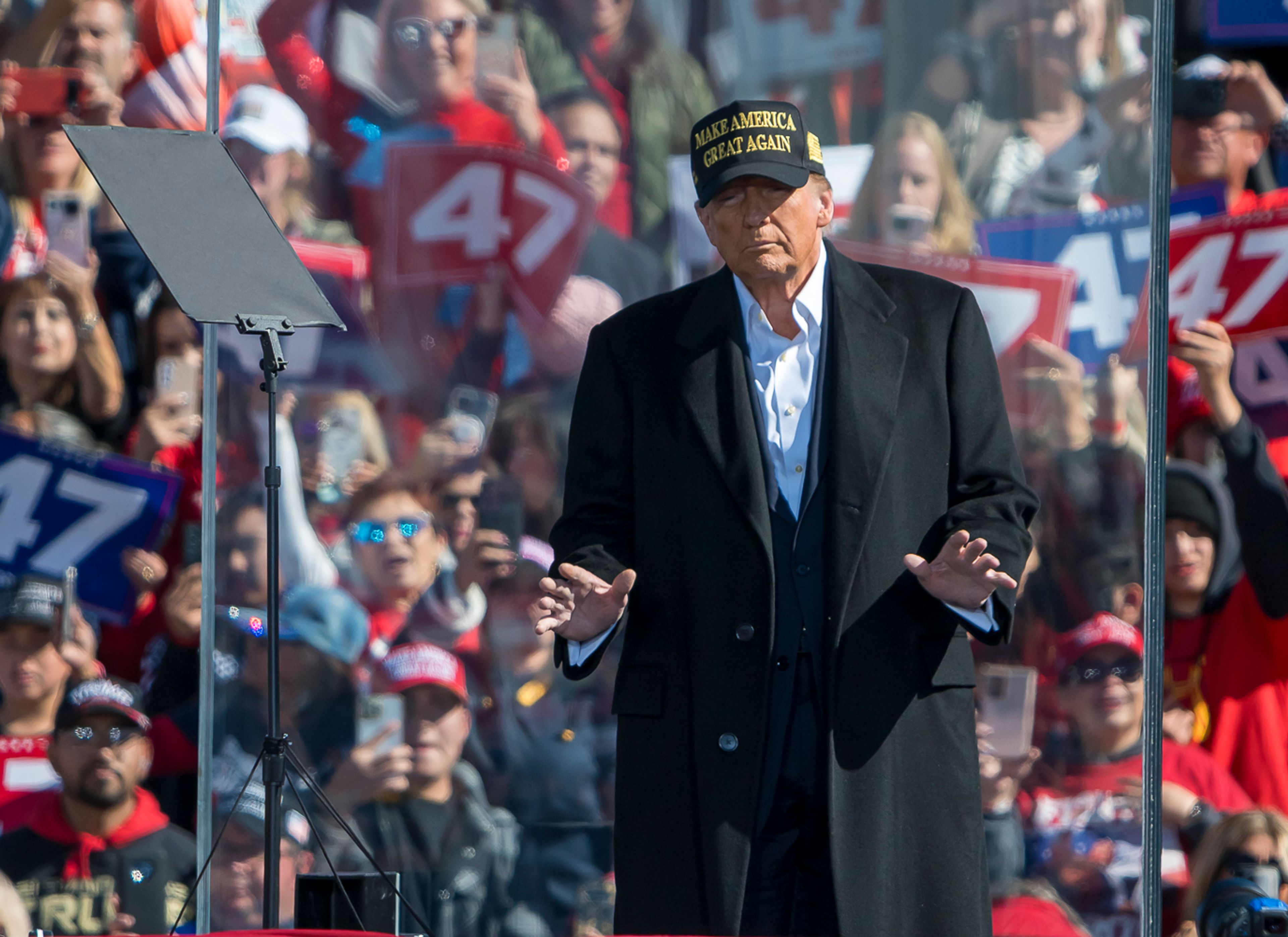ALBUQUERQUE, N.M. — Donald Trump is traveling to New Mexico and Virginia in the campaign’s final days, taking a risky detour from the seven battleground states to spend time in places where Republican presidential candidates have not won in decades.
The former president campaigned in Albuquerque, New Mexico, on Thursday and was scheduled to visit Salem, Virginia, on Saturday.
The Trump team is projecting optimism based in part on early voting numbers and thinks he can be competitive against Democrat Kamala Harris in both states — New Mexico in particular, if he sweeps swing states Nevada and Arizona. That hope comes even though neither New Mexico nor Virginia has been carried by a GOP nominee for the White House since George W. Bush in 2004.
Over the past few months in particular, the battleground states — Arizona, Georgia, Michigan, Nevada, North Carolina, Pennsylvania and Wisconsin — have seen a constant stream of candidate visits, and residents have been bombarded with political ads on billboards, televisions and smartphones. In the past two weeks alone, presidential and vice presidential candidates have made 21 appearances in Pennsylvania, 17 in Michigan and 13 in North Carolina.
In the 43 other states, a candidate visit is an exciting novelty.
Trump retains fervent pockets of support even in states that vote overwhelmingly against him, and he can easily fill his rallies with enthusiastic supporters.
He has made other recent detours from the states most at play, holding rallies at Madison Square Garden in New York and in Coachella, California — states that are even more solidly Democratic than New Mexico and Virginia. Those events satisfied Trump’s long-shot claims that he can win both states, but were also aimed at earning maximum media attention as his campaign seeks to reach voters who do not follow political news closely.
Trump also showed up in staunchly Republican Montana, and both Trump and Harris campaigned on the same day last week in Texas, which Democrats last won in 1976.
Those trips served other purposes, such as highlighting issues important in a state or supporting House or Senate candidates.
Trump said in Albuquerque that he could win the state as long as the election is fair, repeating falsehoods about rigged past elections.
“If we could bring God down from heaven, he could be the vote counter and we could win this,” Trump said. He added he’s visiting New Mexico because it’s “good for my credentials” with Hispanic voters.
Trump’s strategy carries risk.
After losing to Trump in 2016, Democrat Hillary Clinton was criticized for going to Arizona late in the campaign instead of spending time in Wisconsin, Michigan or Pennsylvania, states that ended up deciding that election. Arizona is now a battleground, but it wasn’t considered particularly competitive eight years ago, when it voted for Trump by a 4-percentage point margin.
“I don’t think there’s any strategy,” said Bob Shrum, a longtime Democratic political consultant who worked on numerous presidential campaigns and now leads Center for the Political Future at University of Southern California. “I think he insisted on doing it. It makes no sense.”
New Mexico stop brings Trump to a border state
The planned visit to Albuquerque brings Trump and his immigration stance to a border state with the nation’s highest concentration of Latino voters, highlighting the campaign for Hispanic supporters.
About 44% of the voting-age population in New Mexico identifies as Hispanic. Many have centuries-old ties to Mexican and Spanish settlements, while the state has a smaller share of foreign-born residents than the national average.
At the same time, federal and local authorities in New Mexico are dealing with a surge in migrant deaths along the U.S. border with Mexico.
Trump’s visit has implications for a congressional swing district stretching from Albuquerque to the border with Mexico. It’s now held by a Democrat as Republicans look to hold onto their narrow House majority. Immigration has been a major issue in the race.
Also on the ballot, Democratic Sen. Martin Heinrich is seeking a third term against Republican Nella Domenici. She is the daughter of the late Republican Sen. Pete Domenici, who served six terms, from 1973 to 2009 and was the last New Mexico Republican elected to the Senate.
Independent presidential candidate Robert F. Kennedy Jr. remains on the ballot in New Mexico, and roadside campaign signs for Kennedy popped up across the capital city of Santa Fe in late October, about two months after Kennedy’s withdrawal from the race and endorsement of Trump.
New Mexico voters have twice rebuffed Trump at the polls, and Democrats hold every statewide elected position, all three U.S. House seats and majorities in the state House and Senate.
“He just brings us back to what the U.S. needs to be,” Leandra Dominguez of Albuquerque, 45, said before Trump spoke. “It’s just fallen apart. We just need someone to save us.”
Virginia was once a battleground
While Virginia was considered a battleground as recently as 2012, it has trended toward Democrats in the past decade, especially in the populous northern Virginia suburbs.
Trump lost the state to Clinton in 2016 and Democrat Joe Biden in 2020. This year, Democrats and their allies in the presidential race have spent nearly twice as much as Republicans on ads in Virginia, data show, though it pales in comparison to the spending in battleground states.
“We have a real chance,” Trump said while phoning into a Richmond-area rally on Saturday.
Trump, while in Virginia, is likely to speak about Wednesday’s Supreme Court ruling leaving in place a purge of voter registrations that the state says is aimed at stopping people who are not U.S. citizens from voting.
The high court, over the dissents of the three liberal justices, granted an emergency appeal from Virginia’s Republican administration led by Gov. Glenn Youngkin.
Speaking to Fox News’ Bret Baier on Wednesday night, Youngkin said from what he’s seeing on the ground, “Virginia is far more competitive than any of the pundits would have believed.”
He noted that two years after Biden won by 10 percentage points in 2020, he won as governor.
”Virginians are ready for strength back in the White House,” he said.
Susan Swecker, chairwoman of the Democratic Party of Virginia, said Trump’s scheduled visit to Salem on Saturday would only widen Harris’ lead in the state.
“Kamala Harris will win Virginia convincingly, as he knows, and any visit from this deranged lunatic will only widen the margin,” Swecker said.
___
Associated Press writers Jill Colvin in New York, Morgan Lee in Santa Fe, New Mexico, and Olivia Diaz in Richmond, Virginia, contributed to this report.











